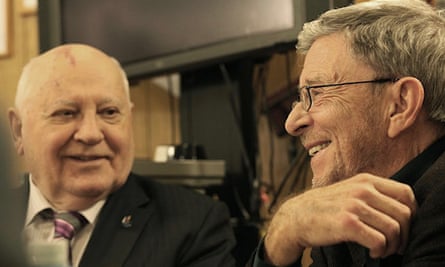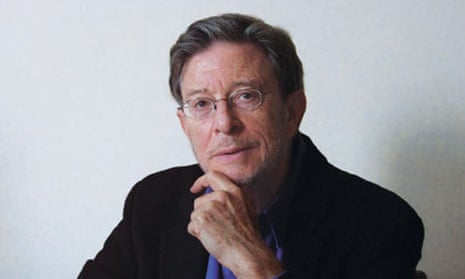The scholar of Russian history and politics Stephen Cohen, who has died aged 81 of lung cancer, challenged the orthodox western analysis of the Soviet Union and post-Soviet affairs. In his magisterial book Soviet Fates and Lost Alternatives (2009), he demolished the claim that Leninism led inevitably to totalitarian dictatorship under Stalin and that the Soviet system of one-party rule and state ownership of property could never be reformed.
He cited three periods when developments could have gone differently from what actually happened: in the late 1920s, when debates within the Politburo came to a head over the New Economic Policy (NEP), which allowed for private enterprise and ownership of land and property; in the early 60s, when Nikita Khrushchev launched key political reforms; and in 1990 and 1991, after Mikhail Gorbachev introduced a mixed economy and social democratic solutions based on political pluralism in place of the Communist party’s monopoly of power.
With his sense of humour, gravelly voice and iconoclastic arguments, Cohen entranced generations of students from his academic perch at Princeton University for the three decades from 1968, in which he rose to be professor of politics and Russian studies, and then at New York University (1998-2011).
He wrote a column in the Nation, under the byline Sovieticus from 1982 to 1987 and in recent years hosted a weekly radio broadcast on Russian-American relations, which he feared were leading to a new cold war. He blamed Bill Clinton and policymakers in Washington for failing to include Russia in a new European order after the Soviet Union came to an end and for expanding Nato eastwards in a spirit of “we won” triumphalism. George W Bush and Barack Obama compounded the failure by siting US anti-ballistic missile systems on Russia’s borders.
During the Soviet period Cohen was unusual among western specialists on Russia in having friends among dissidents as well as reformist intellectuals in the Moscow thinktanks. His book The Victims Return was based on interviews with dozens of survivors of Stalin’s labour camps about their problems in returning to freedom.
Amid the new freedoms permitt- ed by Gorbachev after 1985, Cohen and his wife, Katrina vanden Heuvel, the publisher and editor of the Nation, made frequent long trips to Moscow and got to know the new Soviet leader personally. At one of the last May Day celebrations in Red Square, Gorbachev invited them both to stand beside the Lenin mausoleum to watch the parade.

On Cohen’s death the former Soviet president sent Vanden Heuvel a tribute about her husband, saying: “He was one of the closest people to me in his views and understanding of the enormous events that occurred in the late 80s in Russia and changed the world. Steve was a brilliant historian and a man of democratic convictions. He loved Russia, the Russian intelligentsia and believed in our country’s future.”
A Russian version of Cohen’s 1973 biography of Nikolai Bukharin, a brilliant young Bolshevik who championed the NEP in the 20s, was later published in Moscow and had a wide readership amid new interest in Bukharin’s liberalising ideas. Gorbachev told Cohen he had learned much from the book.
Discussion of the NEP was banned in the Soviet Union after Stalin changed course and embarked on the forced collectivisation of agriculture. Bukharin was arrested and shot after long interrogations and a show trial in Moscow.
During his 70s researches Cohen had tracked down and met Bukharin’s widow, Anna Larina, and they became friends. She appointed Cohen as proxy to examine the archives for her husband’s papers.
Born in Indianapolis, Stephen was the older of two children of Marvin Cohen and his wife, Ruth (nee Frand). His father owned a jewellery shop and a golf course in Hollywood. Stephen went to school in Owensboro, Kentucky, and then to Pine Crest school, Fort Lauderdale, Florida, which he left in 1956.
As an undergraduate at Indiana University he went to Britain on a study-abroad scheme and then on a 30-day trip to the Soviet Union. Intrigued by what he saw, he abandoned plans to become a professional golfer and took up Russian studies. He earned a bachelor’s degree in economics and public policy (1960) and a master’s in Russian studies (1962). He went on to Columbia University and gained a PhD in 1969 with a dissertation on Bukharin’s economic thinking.
In 1962 he married an opera singer, Lynn Blair, but the marriage ended in divorce. He and Katrina married in 1988.
It was Cohen’s early work on Bukharin that led him to the themes that became central to his preoccupations: was the Soviet Union reformable and why did it come to an end? He did not agree with the consensus among western analysts who, with the advantage of hindsight since 1991, claimed that the Soviet Union was doomed to die. He took particular issue with the view that the Soviet Union had come into existence in an illegitimate way in 1917 and had committed so many crimes that it could never become a democracy.
Cohen called himself a “boy from Kentucky” who had accepted segregation until adulthood. He suggested that the gap between the Soviet Union’s professed ideals and Soviet reality was comparable to the long US history of tolerating slavery and discrimination while professing democracy. If the US could change, so could the Soviet Union.
Cohen challenged other arguments. To those who said the Soviet system was unreformable because the communist ruling class would never permit changes that threatened its power, Cohen pointed out that Gorbachev’s main reforms, the introduction of contested elections and the abolition of the party’s monopoly of power, were ratified in the politburo, central committee and two party congresses.
To those who argued that the Soviet system was swept away by a popular revolution from below, Cohen replied that there was no such anti-Soviet movement. The evidence from public opinion surveys up to 1991 was that many Soviet citizens continued to oppose free-market capitalism and to support basic features of the Soviet system, such as public ownership of large industries.
As for the fate of the multi- national federation, Cohen argued that as late as November 1991, during negotiations with Gorbachev, Boris Yeltsin, the Russian president, was expressing support for a new kind of union. Three weeks later he invited the presidents of Ukraine and Belarus to join him in declaring the Soviet Union dead. So it was destroyed by personal ambition in a coup d’etat. It did not implode or fall apart.
Cohen’s last book, War With Russia?, published last year, was a collection of articles and broadcasts from the previous five years during the time when US-Russian relations descended into name-calling. He described himself as an “American patriot” who wanted to see a partnership between the US and Russia to tackle common threats, such as international terrorism.
He passionately opposed what he felt was blind anti-Russian hysteria and the demonisation of Vladimir Putin. “In the three cases widely given as examples of Putin’s ‘aggression’ the evidence points to US-led instigation,” he wrote. The proxy US-Russian war in Georgia in 2008 was started by the US-backed Georgian president who had been encouraged to aspire to Nato membership. The crisis and war in Ukraine resulted from Washington’s long-standing effort to bring that country into Nato despite Ukraine’s shared civilisation with Russia.
Putin’s intervention in Syria was done on a valid premise: to defeat the Islamic State group after Obama refused to join Russia in an anti-Isis alliance.
Cohen was often denounced as “Putin’s Number One American apologist”. Yanni Kotsonis, a colleague at New York University, summed up Cohen’s life differently: “He was one of the few remaining American public intellectuals who did not make a career of trashing Russia or reducing Russia to one man and his critics.”
Cohen is survived by Katrina, his children, Andrew and Alexandra, from his first marriage, and Nicola from his second; four grandchildren, and a sister, Judith.

Comments (…)
Sign in or create your Guardian account to join the discussion